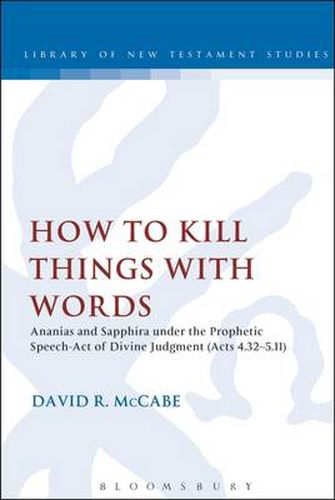Readings Newsletter
Become a Readings Member to make your shopping experience even easier.
Sign in or sign up for free!
You’re not far away from qualifying for FREE standard shipping within Australia
You’ve qualified for FREE standard shipping within Australia
The cart is loading…






This work examines the dynamics of the Ananias and Sapphira episode in Acts and its role in the narrative of Luke-Acts. McCabe locates the passage within its literary context, and emphasizes the manner in which it is embedded in a discourse on the life of the Christian community expressed through shared goods.
Utilizing Speech-Act Theory, McCabe argues that Peter’s words, divinely sanctioned, directly execute the divine judgment upon the couple. This is argued by appealing to the social processes and conventions of language-use within the context of a ‘community-of-goods’ discourse as present in the Lukan narrative.
McCabe appeals to the conventions deployed in the narrative world of Luke-Acts which undergird the efficacy of prophetic speech to effect divine judgment, including the patterns established by prophetic figures in the Scriptures of Israel and Luke’s own characterization of Jesus as Prophet-King, followed by an examination of Luke’s characterization of Peter as an apostolic-prophetic successor to Jesus, deputized to speak on behalf of God. McCabe concludes by examining the successful execution of the speech-act of divine judgment.
$9.00 standard shipping within Australia
FREE standard shipping within Australia for orders over $100.00
Express & International shipping calculated at checkout
Stock availability can be subject to change without notice. We recommend calling the shop or contacting our online team to check availability of low stock items. Please see our Shopping Online page for more details.
This work examines the dynamics of the Ananias and Sapphira episode in Acts and its role in the narrative of Luke-Acts. McCabe locates the passage within its literary context, and emphasizes the manner in which it is embedded in a discourse on the life of the Christian community expressed through shared goods.
Utilizing Speech-Act Theory, McCabe argues that Peter’s words, divinely sanctioned, directly execute the divine judgment upon the couple. This is argued by appealing to the social processes and conventions of language-use within the context of a ‘community-of-goods’ discourse as present in the Lukan narrative.
McCabe appeals to the conventions deployed in the narrative world of Luke-Acts which undergird the efficacy of prophetic speech to effect divine judgment, including the patterns established by prophetic figures in the Scriptures of Israel and Luke’s own characterization of Jesus as Prophet-King, followed by an examination of Luke’s characterization of Peter as an apostolic-prophetic successor to Jesus, deputized to speak on behalf of God. McCabe concludes by examining the successful execution of the speech-act of divine judgment.